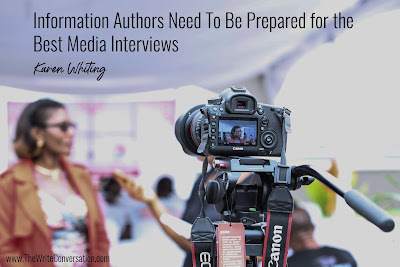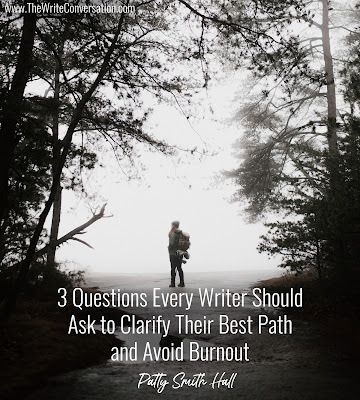Edie Melson's Blog, page 85
June 22, 2023
The Writer's Life—5 Tips for Professional-sounding Podcasts

by Lori Hatcher @LoriHatcher2
Podcast industry data reveals there are at least three million podcasts today*. If you’re an author, appearing on a podcast is an excellent way to expand your reach, promote your book, and share your message. If you’re fortunate enough to secure an invitation to appear on a podcast, these five tips will help your interview sound polished and professional.
5 Tips for a Professional-sounding Podcast
1. Do your homework.
Listen to a few episodes of the show to get a feel for the host’s style, format, and personality. Are the interviews free-flowing and casual or structured? What’s the time frame? Does the host ask questions and expect the guest to carry the majority of the conversation, or do they chime in with their experiences and knowledge?
2. Prepare your environment.
Plan ahead to ensure the best possible recording. Minimize noise by silencing your phone and notifications on your watch and computer. Use earphones on your phone or computer to reduce room noise. Here’s a link to my favorite (inexpensive) earphones. Choose a quiet location, preferably a carpeted room or walk-in closet. Clothes and wall hangings are great noise dampeners. Avoid recording in rooms with tile, hardwood, or high ceilings.
3. Confirm whether the recording is audio, visual, or both.
Many podcasts have a video component. On a recent broadcast, the host and I chatted over a Zoom-type channel. Later, she posted the video interview on YouTube and released the audio version through her podcast channel. Never assume you can show up in your pajamas with no makeup on. Check first.
4. Test your link and equipment well before the time.
Invariably, my Zoom account always decides to update two minutes before an interview. Or I discover my phone battery’s low and I need to recharge. If I check these details an hour before instead of a few minutes before, I have time to make the necessary corrections and avoid a heart-pounding last-minute panic.
5. Make sure you have everything you need nearby.
Always have water available. Room temperature is easiest on your throat. Use a straw to reduce the risk of swallowing wrong and having to cough. If you’re using notes (don’t trust your memory), print them in 14-point font. Write the host’s name and program name on a sticky note in case of a brain freeze.
The next time you receive an invitation to appear on a podcast, accept the invitation with confidence. Apply these five tips, prepare well, and have fun.
Now it’s your turn. Share your favorite recording tip in the comments below so we can learn from each other. Happy podcasting!
TWEETABLEThe Writer's Life—5 Tips for Professional-sounding Podcasts from @LoriHatcher2 on @EdieMelson (Click to Tweet)
* https://www.listennotes.com/podcast-s...
 Lori Hatcher is an author, blogger, writing instructor, women’s ministry speaker, and career dental hygienist. She writes for Our Daily Bread, Guideposts, Revive Our Hearts, and Crosswalk.com. Check out her latest devotional, Refresh Your Hope, 60 Devotions for Trusting God with All Your Heart from Our Daily Bread Publishing. Connect with her at www.LoriHatcher.com or on Facebook, Twitter (@lorihatcher2) or Pinterest (Hungry for God)
Lori Hatcher is an author, blogger, writing instructor, women’s ministry speaker, and career dental hygienist. She writes for Our Daily Bread, Guideposts, Revive Our Hearts, and Crosswalk.com. Check out her latest devotional, Refresh Your Hope, 60 Devotions for Trusting God with All Your Heart from Our Daily Bread Publishing. Connect with her at www.LoriHatcher.com or on Facebook, Twitter (@lorihatcher2) or Pinterest (Hungry for God)Featured Image: Photo by ConvertKit on Unsplash
Published on June 22, 2023 22:00
June 21, 2023
Moving Forward Again When Life Interrupts Your Writing Journey

by Henry McLaughlin @RiverBendSagas
Someone once said, “Life is what happens while you’re busy making other plans.”
I’ve experienced that sensation recently. There I was, considering a contract for one of my novels. I’ve won contests. I’ve self-published. But for only the second time someone—like a real publisher even—formally offered me a contract for one of my books. I enjoyed and savored the experience. Somebody besides me thought one of my stories was worth publishing. Wow!!
I reviewed and studied the contract, consulted with friends and others about the wording and the requirements.
And I prayed. I wanted to do what God wanted. Not what my ego or pride wanted.
While I was waiting for direction, life interrupted…
A health crisis landed me in the hospital for eight days. Eight days of probing and tests and procedures. Not to mention having blood samples taken every four hours. Around the clock. For eight days. A hospital is not a good place to rest.
In the middle of this, my cardiologist of almost twenty years discovered a new heart murmur. More tests. Followed by even more diagnostic tests after I left the hospital. A valve is not working properly. And two arteries are blocked. My doctor is consulting with others to come up with a plan for me.
But the journey continues. I signed the book contract. I had the peace of God about it. I saw it as a calm like how the sun feels after a rain. Warm peace and tranquility. The sense of doing the right thing and pleasing God. I could almost see his smile and nod, a gentle thumbs up.
The contract gives me something to concentrate on, something to balance dealing with the health issues. Now my writing focus is to get the manuscript ready. One more read through as I bring it into compliance with the publisher’s style guidelines.
And through it all and facing what lies ahead, my sense of God’s presence is renewed. He draws me closer and shows more of who he is each day. I’m not where I want to be. But, by God’s grace and mercy, I’m not where I was and I’m on my way to where God’s destiny awaits.
I think it’s going to be a very interesting journey.
How have you experienced God when life interrupts you?
TWEETABLEMoving Forward Again When Life Interrupts Your Writing Journey from author Henry Mclaughlin (@RiverBendSagas) on @EdieMelson (Click to Tweet)
 Henry’s debut novel, Journey to Riverbend, won the 2009 Operation First Novel contest.
Henry’s debut novel, Journey to Riverbend, won the 2009 Operation First Novel contest.Henry edits novels, leads critique groups, and teaches at conferences and workshops. He enjoys mentoring and coaching individual writers.
Connect with Henry on his blog, Twitter and Facebook.
Featured Image: Photo by 35mm on Unsplash
Published on June 21, 2023 22:00
A Dozen Questions to Spur Topics for Bible-Based Writers

by Katy Kauffman @KatyKauffman28
I just didn’t know what to write. After publishing my second book, I thought maybe God wanted me to write about the book of Nehemiah. I have learned so much from Nehemiah’s story, but no, I wasn’t supposed to write about that. Then the gospel of Mark—another book I love and hoped to write about. But I wasn’t feeling it. You know what I mean? I even thought about fiction. (I have a great idea for a YA series.) But it wasn’t the right timing.
If you have the ache to write but don’t know what to write about, don’t lose heart. Now is not the time to give up on the dream of writing, especially if you’ve tried to write about a topic and it didn’t work out. There’s a message waiting for you to tackle it.
If you’re having trouble picking a topic for a book or even a blog post, ask yourself these questions to identify what your next subject may be.
A Dozen Questions to Spur Your Next Topic1. What spiritual topic acts as your homing beacon—you are drawn to it whenever you hear it preached on or mentioned in conversation?2. What book of the Bible do you drift to the most, and what about that book inspires you?3. Do your favorite Bible verses have a common theme?4. If you could identify a major turning point in your life, what would it be? What prompted the change? How are you better off today? (That may be a story you can share with others.)5. What lessons have you learned from mission trips? Parenting? College life?6. Which stories on the news or social media capture your attention? What felt need do these stories address, or what problem do they solve?7. What cause are you most passionate about, and how could your writing help to promote it?8. What one thing would you want to tell someone about God?9. How has Jesus rescued you when you couldn’t rescue yourself?10. What place does faith in God have in everyday life?11. Why is God’s Word a treasure?12. Do you have a special slant through which you see life’s joys and trials, struggles and victories?
After months of praying and searching, I found my third book. I saw a theme from my first two books find its way to my blog—a theme of victory. My third book started as a blog series and turned into a compilation which includes nineteen other authors. The title—Breaking the Chains: Strategies for Overcoming Spiritual Bondage. The hook—how to break free from the chains of fear, worry, anger, loneliness, hopelessness, and twenty other forms of spiritual bondage. I didn’t know this would be the adventure that God had in store—to gather writers to tackle this topic—and our company, Lighthouse Bible Studies, has published four other compilations since then.
You never know what God has in store for you until you seek Him and ask for His guidance. He knows exactly what message He wants to share through our words and our lives. My prayer is that you can identify for each of your projects what God wants you to write about and you enjoy the adventure with Him.
Which of the questions above caught your attention? Did you gain any ideas? Tell us in the comments below, and don’t stop short of feeling God’s nudge to go in a particular direction. Someone will need your message.
TWEETABLEA Dozen Questions to Spur Topics for Bible-Based Writers from author @KatyKauffman28 on @EdieMelson (Click to Tweet)
 Katy Kauffman is an award-winning author, an editor of Refresh Bible Study Magazine, and a co-founder of LIGHTHOUSE BIBLE STUDIES. She loves connecting with writers and working alongside them in compilations, such as Feed Your Soul with the Word of God, Collection 1 which is a 2020 Selah Awards finalist. She also enjoys encouraging writers and giving writing tips in her monthly writers’ newsletter called THE LIGHTHOUSE CONNECTION.
Katy Kauffman is an award-winning author, an editor of Refresh Bible Study Magazine, and a co-founder of LIGHTHOUSE BIBLE STUDIES. She loves connecting with writers and working alongside them in compilations, such as Feed Your Soul with the Word of God, Collection 1 which is a 2020 Selah Awards finalist. She also enjoys encouraging writers and giving writing tips in her monthly writers’ newsletter called THE LIGHTHOUSE CONNECTION.In addition to online magazines, Katy’s writing can be found at CBN.COM, thoughts-about-God.com, and three blogs on writing. She loves to spend time with family and friends, create art and make crafts with her group MY ARTSY TRIBE, and tend the garden in the morning sun. She makes her home in a cozy suburb of Atlanta, Georgia. Connect with her on FACEBOOK and TWITTER.
Featured Image: Photo by Oladimeji Ajegbile on Unsplash
Published on June 21, 2023 12:55
June 19, 2023
7 Tips to Help You Grow Your Social Media Without Sacrificing Time to Write

by Edie Melson @EdieMelson
I teach online and in person—a lot. In spite of the fact that I’m a card-carrying introvert, I love getting to share what I’ve learned about publishing and marketing with other writers. And I love teaching writers the value of social media. One of the things I get asked over and over again is, “How do you accomplish so much and still have time to write.”
This question always thrills me, because I have some tips that can truly make a difference in the person who’s asking. My tips aren’t difficult or expensive or even hard to implement. Many are ones I’ve developed over the years as I’ve tried to give myself more uninterrupted writing time. Others are ones I’ve learned from fellow authors. Today I’m going to share some of the best of them with you.
7 Things to Help Control Your Social Media Life1. Start using a scheduling program. There is no way I could have such a consistent social media presence without the use of Tweedeck. I used to recommend Hootsuite, but they've gotten prohibitively expensive. Buffer is also a good option. Whichever one you choose, using a scheduling program to manage Twitter will be a life-changer. I can schedule all my tweets (not Facebook or blog posts, just social media) for the entire day in thirty-minutes. Then I can be active online, while I’m actually working on writing.
2. Take advantage of Facebook scheduling options. For your professional Facebook page or your group and also for Instagram, you can schedule directly from Facebook.
3. Quit trying to be active on too many networks. Active is the key word here. I have accounts—and up-to-date info—on all the big networks. I’m on Twitter, Facebook, Instagram, Pinterest, MeWee, LinkedIn, YouTube, TikTok, Goodreads, and probably a couple of others I’ve forgotten. So anyone searching these networks will see a recognizable picture of me and a link to my website. BUT, I’m only actively posting to Twitter, Facebook and Instagram. I just can’t keep up with more than that. And truthfully, that’s enough. Choose two or three networks and stick with those.
4. Do your homework and build a library. No, not a room—or building—in which to store your books. I’m referring to last week’s post about How to Always Have Something of Value to Share on Social Media. If you don’t have a ready-made list of places to look for social media updates, it will take you a long time to come up with things to share.
5. Use a timer to keep track of your time. I get it. I can spend hours on Facebook just browsing. But that’s free-time activity, not publishing-related activity. Don’t waste your valuable writing time by getting lost on a social media network. If you have trouble with this, set a timer.
6. Don't spend so much time watching your numbers. You agonize over friends and followers, trying to anticipate the ups and down an stay on an even uphill trajectory. Relax. Your numbers will rise and fall for an infinite number of reasons—most of which you’ll have little or no control over. Do what you need to do (be consistent, use a scheduling program, don’t talk about yourself very often, etc.). Then take a deep breath and limit your number crunching to once a month. If you do the things I’ve mentioned here (and on this blog), your numbers will grow. But more importantly, you’ll make real and valuable connections that will be supporters and readers.
7. Start being consistent on social media. By that I mean you want to avoid skipping a day or two (or a week or two). Then, to make up for it, spending several hours at a time on social media. This All or Nothing Social Media Mindset (I did an entire blog post here) is as bad as doing nothing. It keeps you from gaining any kind of momentum with the effort you’re making. Spending ten or fifteen minutes a day, four to five days a week will get you way further down the road than spending two hours, once a week. The reason is because your name is out there more often. With social media, it’s how often your name shows up, not for how long a time it’s there, that makes the difference.
These are the main things I’ve found that suck my writing time into social media time. I’d love to find what time-wasters plague you—and how you combat them. Be sure to leave your thoughts in the comments section below.
Don’t forget to join the conversation!Blessings, Edie
TWEETABLE7 Tips to Help You Grow Your Social Media Without Sacrificing Time to Write from @EdieMelson (Click to Tweet)
 Edie Melson is a woman of faith with ink-stained fingers observing life through the lens of her camera. No matter whether she’s talking to writers, entrepreneurs, or readers, her first advice is always “Find your voice, live your story.” As an author, blogger, and speaker she’s encouraged and challenged audiences across the country and around the world. Her numerous books reflect her passion to help others develop the strength of their God-given gifts and apply them to their lives. Connect with her on her WEBSITE, through FACEBOOK, TWITTER and on INSTAGRAM.
Edie Melson is a woman of faith with ink-stained fingers observing life through the lens of her camera. No matter whether she’s talking to writers, entrepreneurs, or readers, her first advice is always “Find your voice, live your story.” As an author, blogger, and speaker she’s encouraged and challenged audiences across the country and around the world. Her numerous books reflect her passion to help others develop the strength of their God-given gifts and apply them to their lives. Connect with her on her WEBSITE, through FACEBOOK, TWITTER and on INSTAGRAM.
Published on June 19, 2023 22:00
June 18, 2023
Information Authors Need To Be Prepared for the Best Media Interviews

by Karen Whiting @KarenHWhiting
In teaching about media interviews at conferences, many authors have questions. As a former TV host and a guest on more than 100 shows and repeat guest on favorite TV shows, let me share some answers to questions asked when I teach at conferences.
What if I only have a 7 minute interview?
Focus on one main point you’d like to share. And watch the show you’ll be on to see how authors make the most of the seven minutes. Take notes on what works and what doesn’t and then make notes of how you can approach the interview. It’s amazing how much can be said in a few minutes. Know what you really want to give readers and make sure to have that on the top of your list.
What is the host keeps asking about an area outside of my expertise and experience?
Share that you are not an expert, but you are an expert in (name topic and give some facts on that). If you know someone who is an expert, mention that you will pass on the name, after the show, and contact information for a great guest on that topic in the future. If you have an anecdote that relates to the question, you can give that, especially if it is humorous. Also, you can answer that you may not know but remain thankful God knows everything and through prayer he can enlighten us. You could even add an anecdote when God enlightne3d you, especially on a topic in your book.
What if the host is hostile?
Be kind and respectful. Thank the host for sharing his/her opinion and mention you want to share your perspective and facts that back it up and then mention one fact. Sometimes the host is not trying to be hostile. Once, I had a host put down my new family devotional because it appeared to be mostly crafts and things he did not like to do. I responded that he should turn a few more pages to find the tug-of-war, star gazing, and science experiments. That grabbed his attention. A little while later, wanting to not leave a negative impression in listener’s minds I asked him if he believed dads should be the spiritual head of the family. He affirmed that. So, I mentioned that with craft-based devotions he could let his wife or older child lead the activity and take photos. Then when it was time for the scripture and chat, he could take the lead. He liked the idea and stated three times how dads needed to get the book.
What if the host doesn’t ask anything related to my book?
Build a bridge from a question that you can spin to relate to your book’s topic (do not mention your title just the focus of the book). For example, if they bring up politics, you can share how God’s peace or love should transcend differences and bring up your topic and how it helps. Or if your book is about moms and they bring up something else, share how you as a mom help your children understand that topic, and share an example.
How do I avoid selling and yet let viewers/listeners know about the book?
Sometimes hosts ask how the book is laid out, but other times they just want to discuss the topic of the book. Trust listeners will search online for you if they are engaged by the conversation. In my book on peace I can share about famous peacemakers and tips on peace in relationships without mentioning any of it is in the book. The stories usually grab the host’s attention and that excites those listeners. Also know you can put the link on your social media afterwards with a photo of the book cover.
What do I do when the host uses rapid fires questions?
Briefly answer the question and launch into an anecdote or use the time to give your best sound bites from the book that address the questions. It’s good to have a top ten set of tips for answering a host who does ask one quick question after another and interrupts your responses. You can give one tip that matches each question.
What if the host asks politically charged questions?
Bring up how it must break God’s heart when people are so divided, and that we should work on peace and problems that impact everyone, especially our young people. Or, if you are into apologetics, enjoy the debate but remain respectful.
What’s the best way to approach media that’s new to me?
Watch the show, read reviews, and notice the opening of the show as well as the title. Those provide clues of the focus and where your topic could intersect with the show’s focus. Then craft a pitch that shows you understand the focus and can speak on it.
How can I develop a relationship with a host to be a returning guest?
First, thank the host and then send a written thanks. Follow the host online and comment. Send a Christmas or Easter card to stay in touch. Then you can send a new pitch when you have a new release or can connect a special day or newsworthy topic to the show’s focus to come on again.
Be thankful for each interview and the opportunity to share with a new or repeat group of followers. Post about the interview, provide the link, and share a highlight of the interview.
TWEETABLEInformation Authors Need To Be Prepared for the Best Media Interviews, tips from @KarenHWhiting on @EdieMelson (Click to Tweet)
 Karen Whiting (WWW.KARENWHITING.COM) is an international speaker, former television host of Puppets on Parade, certified writing and marketing coach, and award-winning author of twenty-seven books for women, children, and families. Her newest book, The Gift of Bread: Recipes for the Heart and the Table reflects her passion for bread and growing up helping at her grandparent’s restaurant. Check out her newest book Growing a Mother’s Heart: Devotions of Faith, Hope, and Love from Mothers Past, Present, and Future. It's full of heartwarming and teary-eyed stories of moms.
Karen Whiting (WWW.KARENWHITING.COM) is an international speaker, former television host of Puppets on Parade, certified writing and marketing coach, and award-winning author of twenty-seven books for women, children, and families. Her newest book, The Gift of Bread: Recipes for the Heart and the Table reflects her passion for bread and growing up helping at her grandparent’s restaurant. Check out her newest book Growing a Mother’s Heart: Devotions of Faith, Hope, and Love from Mothers Past, Present, and Future. It's full of heartwarming and teary-eyed stories of moms.Karen has a heart to grow tomorrow’s wholesome families today. She has written more than eight hundred articles for more than sixty publications and loves to let creativity splash over the pages of what she writes. She writes for Crosswalk. Connect with Karen on Twitter @KarenHWhiting Pinterest KarenWhiting FB KarenHWhiting.
Published on June 18, 2023 22:00
June 17, 2023
What’s Next After a Writing Conference?

by Tammy Karasek @TickledPinkTam
Writers are halfway through the 2023 conference season. From east to west, online and in person, writers have met from a day to a week to sharpen their writing ability. They’ve gathered to learn new techniques or the next step in their career paths. They’ve met new friends, editors and agents on the journey to publication.
If you’ve attended a writing conference, you understand the brain overload by the end of it. You’ve taken notes and traded business cards. Faculty appointments made you nervous and now may require follow-up homework or further information requests.
Back home. Now what?
Take a breath. Then begin the process to tackle that list of additional work to be done by you upon your arrival home. It may be overwhelming, so break it down with these simple steps.
Simple Steps to Stay on Track After a Writing Conference
1. Get your conference info organized. Empty your tote bag, laptop case or whatever you tucked all things conference into. Business cards into a pile to get to later. Notes on your desk to sort through and highlight the items you want to do with your current WIP (Work in Progress). Check your phone for any notes from appointments or photos of presentations you’ve taken.
2. Create a list of your follow-up items in priority order. This will keep you on task and allow you to complete all projects from the conference.
Once you’ve organized yourself, you’re ready to work down your list. To have your list of projects in priority order, you will set yourself up for a successful follow-through. Items that need your attention fast, do soon after you’ve returned.
3. Send any information requested as quick as you can. You may have learned you need to include other information or have certain items sent with a requested proposal. Polish your submission, then follow through with that request. It’s reported, 80% of people who had requests for proposals or other information from an agent or editor never send it. Be the 20%—send it!
4. Did you tell someone you met you’d send something to them? Do that next.
5. Take the nice pile of business cards you traded and connect with those conferees through their websites, blogs, and social media accounts. Sign up for their newsletter if it is something you’d be interested in.
6. Go through that stack of class notes or notes from your phone and highlight items you want to use soon to improve how you write. Something in your notes you didn’t quite catch or understand? Research the topic. If the faculty person offered you their email, reach out for further explanation.
7. If you enjoyed a class you took, why not email your faculty member and let them know? They would appreciate that.
I’ve included a few tips to do when you return from a writing conference. If you’ve attended one this year, what would you add to the list? I’m sure I’ve only hit on a few—share your helpful tips below in the comments.
TWEETABLEWhat's Next After a Writing Conference? Steps & Tips from author @TickledPinkTam on @EdieMelson (Click to Tweet)
 Tammy Karasek uses humor and wit to bring joy and hope to every aspect in life. Her past, filled with bullying and criticism from family, drives her passion to encourage and inspire others and give them The Reason to smile. She’s gone from down and defeated to living a “Tickled Pink” life as she believes there’s always a giggle wanting to come out! A writer of Romance—with a splash of sass. She’s also The Launch Team Geek helping authors launch their books and also a Virtual Assistant for several best-selling authors. She is now under contract for her book on Launch Teams due to release Fall 2023. Her work was also published in a Divine Moments Compilation Book—Cool-inary Moments. She’s also the Social Media Manager for the Blue Ridge Mountains Christian Writers Conference, Founding President and current Vice-President of ACFW Upstate SC, and Founding President of Word Weavers Upstate SC. She’s a writing team member for The Write Conversation Blog, Novel Academy, MBT Monday Devotions, The Write Editing and more. Connect with Tammy at HTTPS://WWW.TAMMYKARASEK.COM.
Tammy Karasek uses humor and wit to bring joy and hope to every aspect in life. Her past, filled with bullying and criticism from family, drives her passion to encourage and inspire others and give them The Reason to smile. She’s gone from down and defeated to living a “Tickled Pink” life as she believes there’s always a giggle wanting to come out! A writer of Romance—with a splash of sass. She’s also The Launch Team Geek helping authors launch their books and also a Virtual Assistant for several best-selling authors. She is now under contract for her book on Launch Teams due to release Fall 2023. Her work was also published in a Divine Moments Compilation Book—Cool-inary Moments. She’s also the Social Media Manager for the Blue Ridge Mountains Christian Writers Conference, Founding President and current Vice-President of ACFW Upstate SC, and Founding President of Word Weavers Upstate SC. She’s a writing team member for The Write Conversation Blog, Novel Academy, MBT Monday Devotions, The Write Editing and more. Connect with Tammy at HTTPS://WWW.TAMMYKARASEK.COM.
Published on June 17, 2023 22:00
June 16, 2023
3 Questions Every Writer Should Ask to Clarify Their Best Path and Avoid Burnout

by Patty Smith Hall @PattySmithHall
As I enter this new era of my life, I’ve realized I need a blueprint to guide me through my writing career. For the past twenty years, my plan was relatively simple. Learn the craft. Get an agent and a contract, then write as many books as I could manage.
It’s no wonder I hit burnout!
I don’t want to step into the same pitfalls. I want a clear divide between my family life and my writing, and I don’t want to ever utter the words “I’ll do that when I have time” again. If you don’t make a game plan, it’s like the song says—“There never seems to be enough time to do the things I want to do once you find them.” But to make a plan, there are some questions that need to be answered. Whether you’re at the beginning of your career, in the middle or moving in a different direction like me, here are three questions you need to think and pray on.Clarify Your Writing Path with These 3 Questions
1 What does success look like to me?
Success means different things to different people. To some, it’s all about writing a book and having it published. Maybe success to you is winning awards and seeing your name on a bestseller’s list. It could be looking at your bank account and seeing a large royalty payment.
When I started writing, my view of success was writing for Love Inspired. I’d been reading Harlequin Romances since I was eleven years old and felt that writing for the inspirational line would be a wonderful success. I didn’t care about the money or even the fame as much as I wanted to write stories I could share with my mom and daughters. The day I learned Love Inspired Historical had bought my books, I felt as if I’d made it! God has blessed me with the opportunity to write for other publishing houses but for me at least, writing for Love Inspired Historical was a success.
2. What are your goals?
We all need goals. They keep us motivated when all we want to do is sit on the back deck and read (which I guess is a goal if you think about it.) Making long and short-term goals are important when planning out your writing career. What do you want to accomplish in your first year? Attend a writing conference or submit an article to Chicken Soup for the Soul? What about your three year or your fifth? Long term goals consist of getting an agent or finishing your novel or landing a contract with your dream publisher. Maybe your goals concern money. What do you want to make your first year? Your third? Your fifth?
You also need to think about what you’re willing to give up to meet these goals. Are you willing to give up binge-watching Netflix or stop playing video games so you can meet your word count? How much family and friend time will you give up to write? Think about your emotional goals. Writing takes a lot out of us mentally as well as physically. You need to have a plan on how to successfully balance your work and family life.
Another goal to set—daily word count. Not only are you making progress on your manuscript, there’s instant gratification in meeting a goal.
3. How much money are you willing to spend on your writing?
There’s a reason for the phrase ‘starving artist.’ Like most things, it takes money to write. There are the initial investments—a good laptop or computer, writing programs like Microsoft Word and reference books. You decide to take a class online or even go to a conference which can cost the same as a family vacation. And these expenses don’t end after you’re published. No matter how hard you try or how much you study the craft, you will never learn everything you need to know to be a good writer. The process of learning is a never-ending circle.
My suggestion—make out a writing budget you can live with and stick to it. If you’re married, sit down with your spouse, and discuss your plan. Any royalties that come in should go back into your writing bank account (yes, you need a bank account!) Don’t spend more money than you’re willing to lose.
Answering these questions will be difficult but in doing so, you’ll make it easier on yourself as you start your writing career.
TWEETABLE3 Questions Every Writer Should Ask to Clarify Their Best Path and Avoid Burnout from @PattySmithHall on @EdieMelson (Click to Tweet)
 Patty Smith Hall is a multi-published author, teacher and encourager to new writersjust starting their journey. A founding member of ACFW, she served on the national board and as a Genesis contest coordinator, and presided as president of her local chapter. As an acquisition editor for Winged Publications, she finds great joy in helping and encouraging others reach their publishing dreams. Married almost 40 years to Danny, she finds great joy in her family, friends, and her relationship with Jesus Christ. You can contact her at www.pattysmithhall.com.
Patty Smith Hall is a multi-published author, teacher and encourager to new writersjust starting their journey. A founding member of ACFW, she served on the national board and as a Genesis contest coordinator, and presided as president of her local chapter. As an acquisition editor for Winged Publications, she finds great joy in helping and encouraging others reach their publishing dreams. Married almost 40 years to Danny, she finds great joy in her family, friends, and her relationship with Jesus Christ. You can contact her at www.pattysmithhall.com.Featured Image: Photo by Andrew Neel on Unsplash
Published on June 16, 2023 22:00
June 15, 2023
Seven Common Myths Writers Must Discard to Move Forward and Find Joy

by Crystal Bowman
The world of writing and publishing is exciting, challenging, and confusing all at the same time. Misconceptions and unrealistic expectations abound! In my thirty-plus years of writing, I’ve met many wonderful and sincere people who want to pursue writing but don’t understand the basics.
Debunk 7 Common Writing Myths with the Facts
Myth #1: Since God did something amazing in my life, I need to write a book.
Fact: Many people have personal “God” stories they want share to encourage others—and that’s wonderful! But that doesn’t necessarily mean a book is the right place for that story. If the goal is to reach as many readers as possible, then a magazine, blog, or chapter in a compilation book will reach a much greater audience. When my daughter-in-law wanted to write a book to share her journey with infertility, I told her that her story alone would not reach many readers. Instead, we collected stories from thirty different women and complied those stories into one book so we could reach more women who needed a book on this topic.
Myth #2: Writers only write when they are inspired to write.
Fact: Though it’s true that inspiration happens in the minds of creative writers, for many writers, it’s also a job. Many writers turn their computers on and write because they have work to do. Besides writing from inspired ideas, writers also write because they have deadlines.
Myth #3: If I get writer’s block, I can’t finish my story.
Fact: All writers run into mental roadblocks now and then—it’s part of the process. But that doesn’t mean we quit. When the right words aren’t transferring from your brain to the computer screen, take a short break. Go for a walk or eat a healthy snack. Then get back in your chair and click the keyboard to push through that block and knock it down.
Myth #4: If I can publish a book, I can quit my job.
Fact: That would be wonderful, but most authors don’t make enough money to support themselves. Most writers do not become rich or famous. They write because it’s their passion, ministry, and talent.
Myth #5: God has called me to write so I guess I need to start writing.
Fact: If you believe God has called you to write, then obey that calling. But starting to write immediately is not the way to begin. You can prepare for that calling by learning as much as you can about the world of writing and publishing. Attend writers’ conferences, take online courses, work with writing coaches, and learn about the process from seasoned writers. When people are called to serve God on the mission field, they often go through a period of training before they are sent. The same is true for writers.
Myth #6: Writing children’s books must be easy because they are so short.
Fact: Having a limited word count (as well as limited vocabulary) is what makes writing a children’s book incredibly hard. If it looks easy, that means it was done right. The more a writer learns about writing for children, the harder it gets.
Myth #7: Once my book is published, I can relax and watch it sell.
Fact: Sorry—not true. Getting a book published is the end of one process but the beginning of the next process. Today more than ever, authors need to invest time and money into marketing their books because they will not survive on their own. Social media, speaking engagements, blogs, and podcast interviews are necessary to bring exposure to your book. Even bestselling, award-winning authors must work hard to market their books.
A Final Fact
Just like any other career or ministry, writing takes preparation, education, discipline, and hard work. It’s exciting to see something you’ve written get published where others can read your words. That’s a major accomplishment! But it’s a long, hard journey to arrive at that destination. The best thing you can do right now is to commit your writing to prayer and ask God to guide and direct your writing path—then follow His lead!
TWEETABLESeven Common Myths Writers Must Discard to Move Forward and Find Joy from author Crystal Bowman on @EdieMelson (Click to Tweet)
 Crystal Bowman is an award-winning, bestselling author of more than 100 books for children and four nonfiction books for women. She also writes lyrics for children’s piano music and is a monthly contributor to Clubhouse Jr. Magazine. She loves going to schools to teach kids about poetry. She also speaks at MOPS (Mothers of Preschoolers) groups and teaches workshops at writers’ conferences. When she is not writing or speaking, she enjoys going for walks, working out at the gym, and eating ice cream. She and her husband live in Michigan and have seven huggable grandkids.
Crystal Bowman is an award-winning, bestselling author of more than 100 books for children and four nonfiction books for women. She also writes lyrics for children’s piano music and is a monthly contributor to Clubhouse Jr. Magazine. She loves going to schools to teach kids about poetry. She also speaks at MOPS (Mothers of Preschoolers) groups and teaches workshops at writers’ conferences. When she is not writing or speaking, she enjoys going for walks, working out at the gym, and eating ice cream. She and her husband live in Michigan and have seven huggable grandkids. WWW.CRYSTALBOWMAN.COMWWW.FACEBOOK.COM/CRYSTAL.BOWMANWWW.FACEBOOK.COM/CRYSTALJBOWMANWWW.INSTAGRAM.COM/CRYSTALBOWMANAUTHOR
Featured Image: Photo by Neel on Unsplash
Published on June 15, 2023 22:00
June 14, 2023
Are Your Writing Bags Over Weight? Thoughts on the Burdens Writers Carry

by Edie Melson @EdieMelson
“Come to Me, all who are weary and heavy-laden, and I will give you rest. Take My yoke upon you and learn from Me, for I am gentle and humble in heart, and you will find rest for your souls. For My yoke is easy and My burden is light.” Matthew 11:28-30
It’s getting close to my summer travel season as a writer and speaker, and that means airplane travel. I don’t mind flying, but I absolutely hate packing. You see, I’m a chronic overpacker.
A few years ago, one of my travels gave me trouble. This particular trip was a bigger than usual challenge because I was going to be away for nine days.
I spent several days planning my wardrobe—packing and repacking—weighing and reweighing the suitcase. I was determined to come in under the fifty-pound maximum. Finally success! I even had two and a quarter pounds to spare. I was off, zipping through check-in with no problem, literally flying high.
I enjoyed my week and a half with other writers. It’s always fun to get away with people who truly understand the way your mind works. But in the midst of having fun, I didn’t pay attention to the extra stuff I was accumulating. At these conferences publishers and authors give away tons of books…literally. And I’m a writer—I can never turn down the temptation of a free book—especially from friends! I didn’t prioritize what I needed to carry home versus what I just wanted to carry home.
It turned out there was be a big difference and a high cost.
By the time I had to check back in for the return trip home, I knew I was in trouble. Sure enough, when the clerk at the counter weighed my bag it was four pounds overweight. For those of you who aren’t aware, airlines are serious about weight limits. Even with rearranging, the overage cost me a cool one hundred dollars extra to get home.
As I pondered what I could have done differently, I couldn’t help but draw the comparison of the spiritual weight I carry with me daily as a writers.
Here are some of the things I've been guilty of carrying:
The expectations I take up without reason, The stress and worry I seem to always add to my loadof course I can't forget the guilt I insist on carrying. Some of the guilt comes from things I should have done. Some of the guilt is added because of things I shouldn't have done. The bottom line is that these extra burdens comes from not paying attention to what God is saying, and from not prioritizing my life.
I’ve learned, through experience, this extra spiritual load can cost me as a writer even more than my over-loaded luggage.
It can lead to:burn-outexhaustion (physical and mental)and worst of all, depression
Whenever I see that I’m overloaded, I come back to these verses and hand over all the extra stuff to Jesus. I exchange what I thought I wanted for what He knows I need. And it’s ALWAYS more manageable load.
Now it's your turn. How do you deal with extra weight in your writing life? Share your thoughts and insight in the comments section below.
Don't forget to join the conversation!BlessingsEdie
TWEETABLEAre Your Writing Bags Over Weight? Thoughts on the Burdens Writers Carry from @EdieMelson (Click to Tweet)
 Edie Melson is a woman of faith with ink-stained fingers observing life through her camera lens. She’s a writer who feels lost without that device & an unexpected speaker who loves to encourage an audience. She also embraces the ultimate contradiction of being an organized creative. She knows the necessity of Soul Care and leads retreats, conferences & workshops around the world on staying connected to God. Her numerous books, including the award-winning Soul Cares eries & reflect her passion to help others develop the strength of their God-given gifts. Her blog, The Write Conversation is recognized as one of the top 101 industry resources.
Edie Melson is a woman of faith with ink-stained fingers observing life through her camera lens. She’s a writer who feels lost without that device & an unexpected speaker who loves to encourage an audience. She also embraces the ultimate contradiction of being an organized creative. She knows the necessity of Soul Care and leads retreats, conferences & workshops around the world on staying connected to God. Her numerous books, including the award-winning Soul Cares eries & reflect her passion to help others develop the strength of their God-given gifts. Her blog, The Write Conversation is recognized as one of the top 101 industry resources. She and husband Kirk have been married 40+ years and raised three sons. They live in the foothills of the Blue Ridge Mountains and can often be found hiking—with Edie clinging to the edge of a precipice for the perfect camera angle and Kirk patiently carrying her camera bag and tripod. Connect with her on her website, WWW.EDIEMELSON.COM and through social media.
Featured Image: Photo by Oliur on Unsplash
Published on June 14, 2023 22:00
June 13, 2023
Marketing Yourself as a Ghostwriter and Important Elements of a Ghostwriting Contract

by Linda Gilden @LindaGilden
This month we are going to finish our series on ghostwriting by discussing two things: 1) How to market yourself as a ghostwriter and 2) The important elements of a ghostwriting contract.
How to Market Yourself as a Ghostwriter
Let’s start with how to market yourself as a ghost. Marketing yourself in not always easy, especially if you are not an extrovert. You will eventually have to talk to others about yourself and your new ghostwriting endeavor. However, you will find many ways to market yourself even if you are an extreme introvert. As you will discover, many things can be done without even interacting with others while you build your confidence.
Word of mouth is still one of the best marketing plans. Those who read your book, especially those you have ghostwritten and get excited about them, will tell their friends. Give a copy to your family and friends and ask them to write reviews as well as tell others that you are also a ghostwriter. Sometime it feels like we are giving away lots of books. But rarely have I regretted giving one to someone who has a need and someone who will tell their friends about it. Your name does not always appear on the front of the book so you may need to take a minute to explain that to friends and family.
Many people post readily on social media even though they have never have met the people on the other end of their posts. But announcing ghostwriting as a new element of your career will help you get the word out. Social media allows you to use photos of you opening the box of books and the excitement on your face. Giving a copy to your friend have a good friend to take a picture of pulling your book out of a gift bag. Make sure he or she identifies it is a ghostwritten book in their post. If you have grandchildren, dress them up really cute and have them gather around your book. Maybe even have a few of them jumping up and down.
Find blogs that share the same message as the book you are ghosting and inquire about being a guest blogger. You could repeat that with many different blogs. Just be sure to be able to meet the deadlines. You may decide to organize this as a blog tour and blog for a different blog each week. If possible. Offer a “freebie” as an additional incentive to become interested in your book and your new ghostwriting segment.
When you add ghostwriter to your website, be sure to use SEO (Search Engine Optimization) to drive your website higher in rank on Google. If you don’t know how to do this, there are experts you can hire to do a website evaluation.
Writing articles is an excellent way to get your name out about your ghostwriting. In your bio always be sure to include the word ghostwriter. Bios aren’t long but if you are trying to begin a ghostwriting career, make sure ghostwriter is one of your key words.
Important Elements of a Ghostwriting Contract
Any agreement you make with another writer such as co-writing, ghostwriting, editing, article writing, or whatever should be accompanied by a written contract. Many co-authors feel like they are really good friends but a contract has nothing to do with friendship but everything to do with business. When you have it in writing, there will be no questions twenty years later about the elements of your original conversation.
Here are a few things you want to be sure to include:
1. The date when you entered into the agreement.
2. Who the author and who the ghostwriter is. Along with stating that, it might be a good time for both the author and the ghostwriter to discuss whether or not the ghostwriter’s name will be on the cover or if a confidentiality clause is necessary for the contract.
3. The method you will use to get this book or story written. In other words, will you meet regularly so you will understand how to organize the story. Will you exchange information by email? Will it all be done by phone communication? If you don’t know your subject well, it is always a good idea to get together at least a few times.
4. A statement of the fees of the ghostwriter and how to be paid. Sometimes ghostwriters are paid a flat fee as a work made for hire. Then they receive no further compensation. Occasionally the author and ghostwriter will share the royalties depending on an already agreed upon split.
5. The deadline to complete the manuscript. You may want to break this down into phases for each section of the project.
6. The author agrees that any material he or she gives to the ghostwriter is his own material and not copied from anywhere else.
7. If the author withdraws from the project, the ghostwriter is entitled to a kill fee as determined by the author and ghostwriter.
8. What happens to royalties if one author dies, quits writing, or is unable to finish the project? Usually it is divided between the remaining heirs of the one who is unable to finish and the remaining author.
There will be other things you want to include after a conversion between the author and the ghostwriter. Once you have that conversation with your author, you should be able to “fill in the blanks” with other things you would like to include.
Now that you have enough information to get started, get to your computer and look for your first client. Or work on your bios and add ghostwriter in the appropriate places. If you have other questions, please put them in the chat and I will get back to you as soon as possible.
For now, happy ghostwriting to all our readers!
TWEETABLEMarketing Yourself as a Ghostwriter and Important Elements of a Ghostwriting Contract, @LindaGilden on @EdieMelson (Click to Tweet)
Don't Miss the Other Posts in this Series!
WHAT IS GHOSTWRITING AND HOW TO GET STARTED (PART 1)
HOW TO GET STARTED IN GHOSTWRITING (PART 2) MARKETING YOURSELF AS A GHOSTWRITER AND IMPORTANT ELEMENTS OF A GHOSTWRITING CONTRACT
 Linda Gilden has coauthored 11 books with 5 different coauthors, with #12 and #13 debuting in 2022, adding a new co-author to the list. She loves every one of her coauthors and enjoys collaborating on interesting projects with them. She also has written many books on her own and realizes what a treasure and blessing a good co-author is.
Linda Gilden has coauthored 11 books with 5 different coauthors, with #12 and #13 debuting in 2022, adding a new co-author to the list. She loves every one of her coauthors and enjoys collaborating on interesting projects with them. She also has written many books on her own and realizes what a treasure and blessing a good co-author is.
Published on June 13, 2023 22:00



